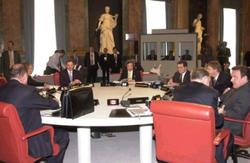 Prospects for Russian and Chinese membership in the Group of Seven brightened as Germany voiced support for the eventual admission of the two emerging market powerhouses to the world`s richest club. Prospects for Russian and Chinese membership in the Group of Seven brightened as Germany voiced support for the eventual admission of the two emerging market powerhouses to the world`s richest club.
German Finance Minister Peer Steinbrück told a press conference in Essen on Friday at the start of a two-day meeting of G7 finance chiefs that he favored extending membership to Moscow and Beijing.
He spoke shortly after Russian Finance Minister Alexei Kudrin, who is attending the session as a guest, complained that Russia was being kept out of the club for political reasons.
According to Steinbrück, however, the G7 was "in a process of expansion" which should "eventually result in the full membership" of Russia and China.
"It doesn`t make sense for Russia not to be a full member," Steinbrück said.
Political motives
Russia does join the members of the G7 -- Britain, Canada, France, Germany, Italy, Japan and the United States -- to form the Group of Eight for annual summits on political and broad economic matters. But Moscow has yet to make it into the Group of Seven, which focuses exclusively on financial issues such as global growth, exchange rates, trade and oil prices.
"There are evidently political motives that stand in the way of our full membership of the G8 finance group," Kudrin told Germany`s daily Die Welt newspaper. "Russia successfully pursued its economic growth strategy last year and I believe that as finance ministers we are ready to meet in full G8 format."
Surpassing Italy and France
Russia`s absence from Group of Seven finance deliberations has been attributed to the relatively small size of its economy when compared to current G7 members.
But Kudrin, addressing the press in Moscow on Thursday, said the Russian economy had surpassed that of Italy last year and should eclipse France in 2009.
"We are a real economy, which attracts investment and has a good pace of development," he said.
With the ruble now fully convertible, Russia last year received inward capital flows amounting to $41.5 billion (31.9 billion euros), according to Kudrin.
Expanding makes sense
According to Germany`s finance minister, expanding the G7 block would be a logical step to take.
"There are so many issues where it simply doesn`t make sense not to discuss them without important emerging countries like China, India, South Africa, Brazil and Australia to name but a few," Steinbrück said. "I think we should also have them at the table.
"There`s no formalized process as yet. But my personal opinion is that in two, three, four years, we`ll no longer have the G7-G8, but a G10 or a G14," he said.
Steinbrück pointed out that "it is practically already the case" that a number of emerging countries participate in the talks.
In addition to Russia, five other non-G7 states are here this weekend as guests, China, Brazil, India, Mexico and South Africa.
A question of principles
Steinbrück`s enthusiasm for China`s inclusion appeared to stand in contrast to a position by German Chancellor Angela Merkel, who at a Group of Eight summit in Saint Petersburg last July suggested that now is not the time to consider Beijing`s admission.
"The G8 groups countries that play a certain role in the world economy and that observe a certain number of principles, such as intellectual property rights, and for the moment I see no need to change that," she said at the time.
China is routinely accused by its trading partners of not taking sufficiently robust action against counterfeited goods. - Deutsche Welle
sections: Politics, World News, Region News
areas: Central region
|